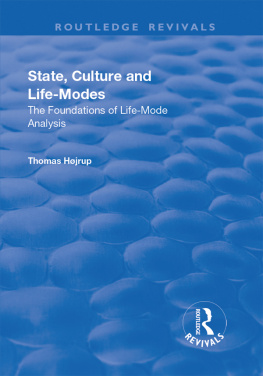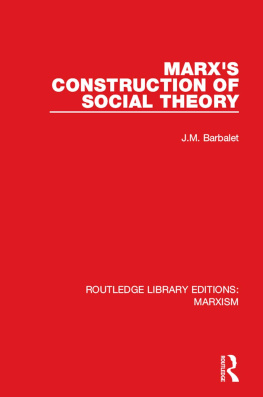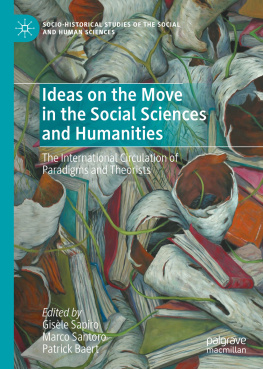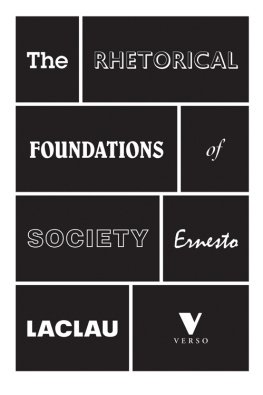First published 2003 by Ashgate Publishing
Reissued 2018 by Routledge
2 Park Square, Milton Park, Abingdon, Oxon OX14 4RN
711 Third Avenue, New York, NY 10017, USA
Routledge is an imprint of the Taylor & Francis Group, an informa business
Copyright Thomas Hjrup 2003
The author has asserted his moral right under the Copyright, Designs and Patents Act, 1988, to be identified as the author of this work.
All rights reserved. No part of this book may be reprinted or reproduced or utilised in any form or by any electronic, mechanical, or other means, now known or hereafter invented, including photocopying and recording, or in any information storage or retrieval system, without permission in writing from the publishers.
Notice:
Product or corporate names may be trademarks or registered trademarks, and are used only for identification and explanation without intent to infringe.
Publishers Note
The publisher has gone to great lengths to ensure the quality of this reprint but points out that some imperfections in the original copies may be apparent.
Disclaimer
The publisher has made every effort to trace copyright holders and welcomes correspondence from those they have been unable to contact.
Translation: Steven Sampson
Lay-out: Lise Glindvad
I owe warm thanks to Mette Knigsfeldt for her careful work with the English text.
A Library of Congress record exists under LC control number: 2002028132
ISBN 13: 978-1-138-71851-7 (hbk)
ISBN 13: 978-1-315-19453-0 (ebk)
This book presents a conceptional framework for life-mode analysis which differs from the conventional modes of analysis within the social sciences and humanities. While the original concept of life-mode has stimulated further research on life modes in several disciplines in Scandinavia, the theoretical foundations of life-mode analysis need further explication. The lack of a comprehensive foundation reflects the fact that life-mode analysis builds upon a scientific tradition which even one or two generations ago was totally overshadowed by this centurys dominant epistemological theory. I am thinking here of dialectics, which, until about 1870, when Neo-Kantianism became dominant in Germany and France, was a fundamental theory of science and which had served as an alternative to modern epistemologys rationalism, empiricism and realism. Around 1930, research in Germany (the Frankfurt School) and in France (Kojve) again turned back to dialectics. French philosophers such as Gaston Bachelard, Georges Canguilhem and Louis Althusser gave the dialectical theory of science new meaning and in the post-war period passed it on to new generations of researchers.
In Copenhagen, the physicist Anders Boserup came to play a decisive role in helping to reintroduce dialectics via his teaching of the ideas of Hegel, Bachelard, Hyppolite and Althusser. In the works of these theorists of science, Boserup found a rare description of the features which give the sciences their special ability to learn from their experiences, accumulate theoretical insights, and transcend previous discoveries. It was a mode of analysis which Boserup himself had experienced in connection with Niels Bohrs theoretical work. Yet this tendency was not limited to the natural sciences. The work of one of Bohrs contemporaries, the Danish linguist Louis Hjelmslev, in restructuring linguistic modes of analysis pointed in the same direction, and the ideas of Bohr and Hjelmslev had an impact on the French theorists of science in their efforts to develop structural dialectics. Copenhagen was thus hardly isolated from the efforts of French scholars to resuscitate structural dialectics.
Like so many dialecticians before him, Anders Boserup stood quite alone with his profound insights into metamathematics and theoretical physics, which he combined with studies of Aristotles, Leibniz and Hegels logic and with the dialectical theory of science of Bachelard and Althusser. After Boserup assumed his position at the Institute of Sociology at Copenhagen University in 1970, he and the philosopher Helmuth Hansen began an ongoing seminar in the theory of science, the theme of which was structural dialectics. This scientific endeavour, which confronted logical empiricism and hermeneutic epistemology, was applied to both the natural and humanistic sciences. The ideas of the seminar developed via the negation of every theorem which on closer examination did not show itself to be valid. The interdisciplinary seminar in structural dialectics continued following the deaths of both Helmuth Hansen, and later, of Anders Boserup, and today remains a stimulating forum for researchers interested in conceptual development in this field.
It was Anders Boserups great achievement to introduce natural scientific modes of analysis into humanistic research without becoming victim to the misunderstandings of positivism and hermeneutics regarding theoretical research, especially in physics. In this way, we who began as students in this interdisciplinary seminar ethnologists, sociologists, historians, philosophers, mathematicians and philologists became acquainted with the type of theoretical work which the French theoreticians of science had studied and which was the foundation upon which they built their descriptions of the essential structural features of science. The French structural theory of science had a profound impact upon our own work and enabled us to use structural dialectics to grapple with some of the specific problems in our various disciplines.
For ethnologists, this research environment provided the possibility to proceed to the basic problems of cultural theory using a new approach. I myself was fortunate enough to become part of a research team at the Danish Institute for Building Research led by Johannes Mllgaard and Niels Bje Groth, which focused on regional planning and living conditions. The project attempted to provide practical descriptions of the distinct principles for peoples way of life considered significant for peoples attitudes about, and need for, special solutions in the realm of physical planning (Groth and Mllgaard, 1979). The conceptual problems which grew out of the research for this project were discussed at our seminar in theories of science, and the ideas which the discussions provoked could be tested in the empirical research on regional planning and ways of life. These results could in turn be examined in the theoretical research environment, and so on. This interaction between Mllgaards and Groths research activity, on the one hand, and the seminar in theories of science on the other, helped form the basis for my own analysis of wage-earner, self-employed, and career-professional life-modes in my book Det glemte Folk (The Forgotten People, Hjrup, 1989a).
In the following years, we continued to work with several of the fundamental problems raised by life-mode analysis which had to be further refined if this mode of analysis was to be developed further. During this period, Anders Boserup introduced us to Hegels Science of Logic and Phenomenology of the Spirit (Hegel, 1981, 1983). Boserup succeeded in extracting the classical praxis concept and the classical concept of self-consciousness which we would explore in the coming years in order to further develop the concepts of life-mode and mode of production. The concept of praxis turned out to be a kind of mother-concept for the concepts of life-mode and of mode of production, making it possible to elaborate the internal logical relations between the two. Several years of work with Hegels logical concepts eventually provided a coherence and a transparency to our analyses of specific life-modes and social formations. Anders Boserups ability to extract Hegels logic within the elegance of dialectics has not only made it possible to obtain great benefits from Hegels work, but also to further refine Hegels own approach.






